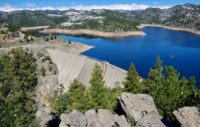Denver Water is moving forward with a $464-million project to expand Gross Reservoir, following a Nov. 2 settlement with Boulder County, which had opposed the plan. Located southwest of Boulder, Colo., the dam project is a critical component of the utility's ability to provide water tor 1.5 million customers in metro Denver.
The expansion will raise the dam's height by 131 ft, which boosts the reservoir capacity by 77,000 acre-ft, nearly tripling its size. When the project is complete, the new capacity of roughly 119,000-acre-ft will improve the balance between Denver Water’s north and south sections. The agency has been developing a plan to increase capacity for more than 16 years. The original designers anticipated need for an expansion when the reservoir was built in 1954.
The settlement marks the end of several years of legal disputes amid the county's concerns about the disruptive nature of construction at the dam.
“The immediate area around Gross Reservoir has about 250 homes, and there are other areas that will be impacted by truck traffic. Construction is going to involve a significant amount of tree removal, blasting, hauling, dust and noise,” says Michelle Krezek, chief of staff for the county commissioners office. “Despite the settlement, we remain concerned about the impacts to residents and the environment.”
The $12.5-million-plus settlement includes $5 million in funding to mitigate disruptions to area residents and provide benefits to both the environment and neighbors and $5.1 million for open space funding to replace land that will be inundated by water, and the transfer of 70 acres of land near Walker Ranch Open Space to Boulder County.
“A substantial portion of Denver Water’s planning for this project revolved around avoiding disruptions to the community and natural resources,” says agency engineering manager Doug Raitt. Construction activities will rely on electric power rather than diesel generations. Hours for truck traffic and road work will be limited, and $1 million is earmarked to restore a critical species habitat on the South St. Vrain Creek at the Hall Ranch Lyons Quarry.
“Denver Water is working closely with the Federal Energy Regulatory Commission to secure final approval of the construction documents and targets early April 2022 to start construction,” Raitt adds.
Stantec and AECOM lead the design team. Denver Water is finalizing the contract with the Kiewit Barnard joint-venture contracting team. The project involves adding 900,000 cu ft of roller-compacted concrete to the dam, which will require drawing down the reservoir during construction while maintaining a moderate level of capacity to keep it operating.
Denver Water reports that capital expenditure planning has accounted for construction costs within the agency’s established rates. Water rates are commonly measured in acre-ft, with one acre-ft equaling about 326,000 gallons, or enough water to cover one acre of land. The national per capita average is 2.5 acres, while Denver Water conservatively operates at about one-half-acre per person, the agency says.
When construction is complete in July 2027, the dam will be the tallest in Colorado and the tallest roller-compacted concrete dam in the U.S.




Post a comment to this article
Report Abusive Comment